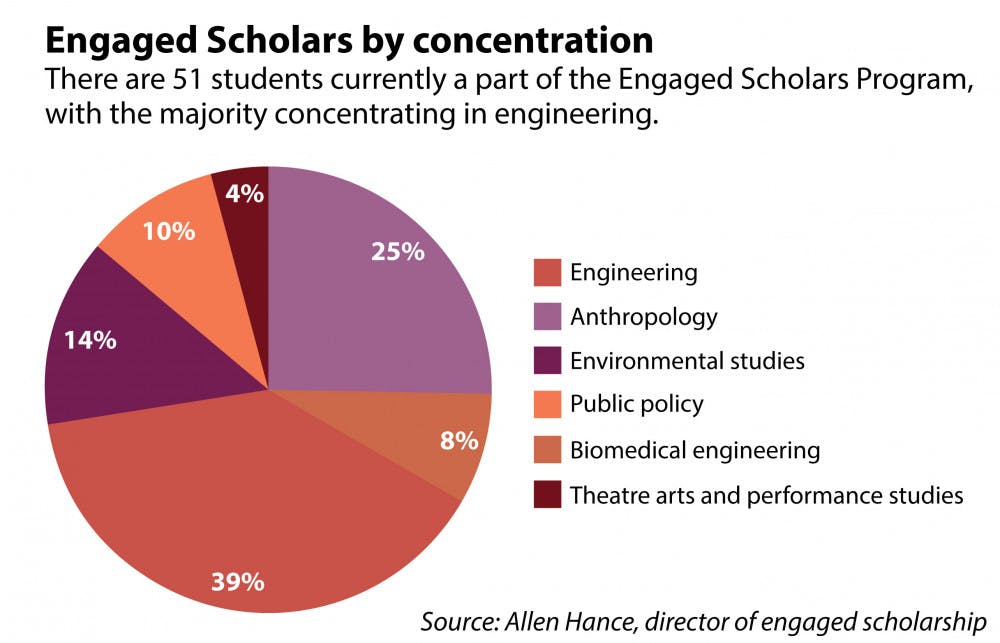The Engaged Scholars Program — a collaborative initiative between the Swearer Center for Public Service, the Dean of the College and multiple academic departments — will expand to encompass 12 concentrations, an increase of seven from the previous year.
The new concentrations will include business, entrepreneurship and organizations, contemplative studies, education studies, political science, sociology, urban studies and independent concentrations, according to the Swearer Center’s website. Students in anthropology, engineering, environmental studies, public policy and theatre arts and performance studies have been able to participate in the program since it launched last year.
The purpose of the ESP is for students to connect their academic work with community-based organizations. In addition to fulfilling their concentration requirements, students in the ESP must take an “engaged course” within their concentration and an ESP-specific seminar, SOC0310: “Theory and Practice of Engaged Scholarship.” They must also complete a capstone project and along with a 150-250 hour practicum with a community partner, according to the website.
The hope is for the program to expand every year and ultimately include at least half of the concentrations offered at the University in order to cover a broad range of subjects, said Dean of the College Maud Mandel. This will allow the program to have the “most diverse set of students,” she added.
“Many Brown students feel empowered and driven to fix some of the biggest problems facing our society locally, nationally and internationally, and figuring out ways to link what they’re learning in the classroom with the kind of work, passions and commitments they have outside of the classroom is woven into the ‘Brown student mentality,’” Mandel said, noting that 29 percent of Brown graduates go into nonprofit work, as The Herald previously reported.
The program’s current cohort includes 51 students within anthropology, biomedical engineering, engineering, environmental studies, public policy and theatre arts and performance studies, wrote Alan Hance, director of engaged scholarship, in an email to The Herald.
Kaori Nagase ’17, who is in the ESP and concentrating in environmental studies, said that she participated in “engaged courses” before the program existed. For example, in her environmental studies course, ENVS 0110: “Humans, Nature, and the Environment: Addressing Environmental Change in the 21st Century,” every section had an engaged component that focused on sustainability and social equity, she said. Students participated in group projects with a community partner organization, where Nagase worked with Childhood Lead Action, a nonprofit that mitigates poisoning from lead pipes in Rhode Island.
The program also allows students to gain work experience both within the local community of Rhode Island and internationally. For example, Nagase completed her practicum last summer with Farm Fresh Rhode Island, a nonprofit organization, and also worked in rural villages in Thailand that face issues with land development and health.
“The community-based work we want to encourage is however those communities are defined,” Hance said, adding that even the possibility of engaging with virtual communities has been proposed.
Ben Miller-Gootnick ’17.5, an engaged scholar in public policy, completed his practicum in Washington D.C. with the Office of Legislative Affairs, where he did research on seaport trade and later, Iran.
Miller-Gootnick’s experience during his practicum was “phenomenal,” and crystallized the engaged scholarship he was already doing, he said.
In their mandatory seminar, students in ESP are posed with a problem and then asked to solve it from the lens of their concentrations, Miller-Gootnick said.
“All these kids tackled it from a different perspective and as (the program) expands to more disciplines, it will definitely become a more vibrant community,” he added.
The program “creates a true two-way street” and a “melding of ideas within a collaborative environment,” Miller-Gootnick said. “It’s a really exciting model for the integration of academic learning and community experience.”
Currently, there are many social science disciplines represented in the program, but other departments in different fields have expressed interest in participating, Hance said, adding that there is “a lot of opportunity” for pre-med students, for example, to do engaged work.
The program is open to all students declaring their concentrations, though it may be more difficult for those beginning past their fifth semester to complete the program, according to the website. But, it really depends on the passion of the students as the selection process seeks to gauge “the intention and passion around doing community based work,” Hance wrote.
“I really see this engaged scholars initiative as the next phase of the open curriculum,” Mandel said. “I would like if any student in any concentration who wanted to do this ultimately could.”





